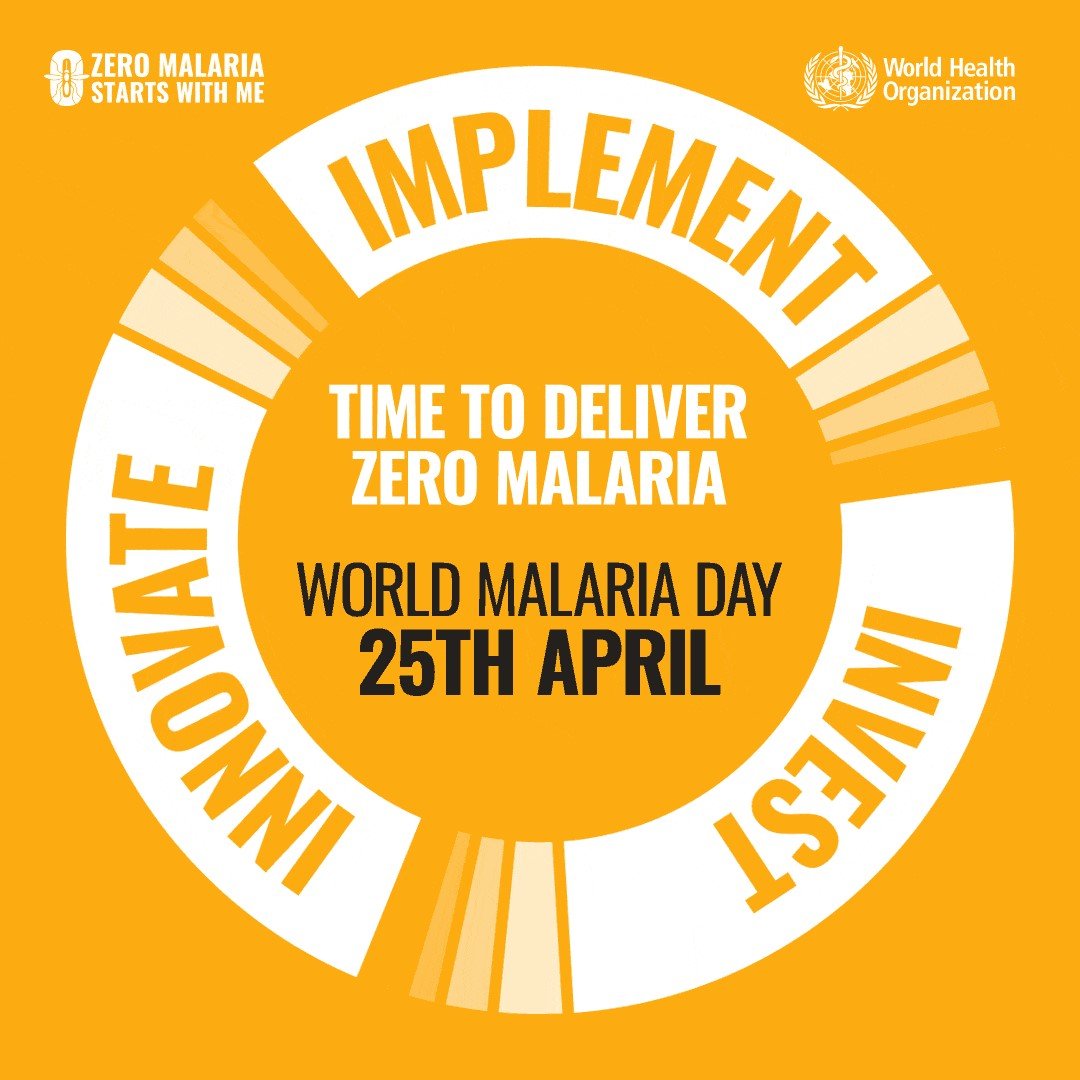Malaria: A Global Menace - Examining its Prevalence, Symptoms, Epidemiology, and WHO's Response to Combat the Disease
It’s world malaria day on 25th April 2023
“World Malaria Day 2023 will be marked under the theme “Time to deliver zero malaria: invest, innovate, implement”. Within this theme, WHO will focus on the third “i” – implement – and notably the critical importance of reaching marginalized populations with the tools and strategies that are available today.”
619 000
Malaria deaths in 2021
247 million
New cases of malaria in 2021
95%
Of all malaria cases are in WHO African Region
“According to the latest World malaria report, there were 247 million cases of malaria in 2021 compared to 245 million cases in 2020. The estimated number of malaria deaths stood at 619 000 in 2021 compared to 625 000 in 2020.
Over the 2 peak years of the pandemic (2020–2021), COVID-related disruptions led to about 13 million more malaria cases and 63 000 more malaria deaths. The WHO African Region continues to carry a disproportionately high share of the global malaria burden. In 2021 the Region was home to about 95% of all malaria cases and 96% of deaths. Children under 5 years of age accounted for about 80% of all malaria deaths in the Region.
Four African countries accounted for just over half of all malaria deaths worldwide: Nigeria (31.3%), the Democratic Republic of the Congo (12.6%), United Republic of Tanzania (4.1%) and Niger (3.9%).”
What is malaria?
Malaria is a really serious disease that's mainly found in tropical countries and can be spread to humans by certain types of mosquitoes. The symptoms can vary from mild to really severe, and certain groups of people, like children under 5, pregnant women, and people with certain health conditions, are more at risk of getting seriously ill.
Malaria is usually spread through the bites of infected female Anopheles mosquitoes, but it can also be transmitted through blood transfusions or contaminated needles. The first symptoms can be similar to other illnesses, so it can be hard to recognize at first. But if it's not treated, especially the P. falciparum species, it can lead to really serious illness and even death within a day.
There are actually 5 different species of Plasmodium parasites that can cause malaria in humans, but P. falciparum and P. vivax are the most dangerous. P. falciparum is actually the deadliest and most common in Africa, while P. vivax is more common in other parts of the world. The other species that can infect humans are P. malariae, P. ovale, and P. knowlesi. (World Health Organization, 2023).
The most common early signs of malaria include fever, headache, and chills, which usually appear within 10-15 days of being bitten by an infected mosquito. Symptoms can be mild for some people, especially those who have had malaria before. Because some malaria symptoms are not specific, it's important to get tested early.
Malaria can cause severe illness and even death, especially for infants, children under 5 years, pregnant women, travellers, and people with HIV or AIDS. Severe symptoms include extreme tiredness and fatigue, impaired consciousness, multiple convulsions, difficulty breathing, dark or bloody urine, jaundice (yellowing of the eyes and skin), and abnormal bleeding. If you experience severe symptoms, seek emergency care immediately. Treating mild malaria early can prevent the infection from becoming severe.
Pregnant women who get malaria may deliver prematurely or have a baby with low birth weight. (World Health Organization, 2023).
How is malaria transmitted?
Malaria is primarily transmitted through the bite of an infective female Anopheles mosquito. These mosquitoes can only transmit malaria if they have previously taken a blood meal from an infected person. During the blood meal, the mosquito takes in a small amount of blood containing malaria parasites. When the mosquito bites another person about a week later, the parasites mix with the mosquito's saliva and are injected into the bloodstream of the bitten person.
Malaria can also be transmitted through blood transfusions, organ transplants, or the sharing of contaminated needles or syringes. In addition, malaria can be passed from a mother to her unborn baby before or during delivery.
Malaria is not a contagious disease and cannot be spread from person to person through casual contact. It cannot be transmitted through sexual contact either. (Prevention, 2021).
How is malaria treated?
It is crucial to receive prompt treatment for malaria in order to prevent the disease from progressing to a severe and life-threatening stage. There are several effective antimalarial drugs available, which should be taken early on in the course of the disease. If you are sick and have been in an area with malaria, it is important to seek medical attention immediately so that the disease can be diagnosed and treated promptly. (Prevention, 2021).
The treatment for malaria typically involves prescription drugs, which can cure the disease. The specific drugs used, and the length of treatment depend on factors such as the type of malaria, the location of the infection, the patient's age, whether or not they are pregnant, and the severity of the illness at the time of treatment.
In the past 10 years, there has been an emergence of partial artemisinin resistance that poses a risk to malaria control efforts worldwide in the Greater Mekong subregion. Recent reports of partial artemisinin resistance in Africa, specifically in Eritrea, Rwanda, and Uganda, have raised concerns for the WHO. To inform treatment policies in countries where malaria is endemic and to promptly detect and respond to drug resistance, it is crucial to regularly monitor the effectiveness of antimalarial drugs. (World Health Organization, 2023).
How can malaria be prevented?
Malaria can be prevented by taking steps to avoid mosquito bites or by taking medication. Consult with a healthcare professional about taking medication such as chemoprophylaxis before traveling to areas where malaria is prevalent.
Here are some ways to reduce the risk of getting malaria by avoiding mosquito bites:
Use mosquito nets while sleeping in areas where malaria is present.
Apply mosquito repellents (containing DEET, IR3535 or Icaridin) after dusk.
Use coils and vaporizers to repel mosquitoes.
Wear protective clothing such as long-sleeved shirts and pants.
Install window screens to keep mosquitoes out. (World Health Organization, 2023).
Why is malaria so prevalent in Africa?
In Africa south of the Sahara, malaria is common because the most efficient malaria-transmitting mosquito species, Anopheles gambiae, is prevalent in the region. Moreover, the most dangerous and fatal malaria parasite, Plasmodium falciparum, is also prevalent in the area. The lack of resources and political instability in many African countries make it difficult to establish effective malaria control programs. Additionally, the widespread resistance of malaria parasites to antimalarial drugs is another significant challenge to malaria control efforts in Africa. (Prevention, 2021).
“Malaria is an emergency and needs to be treated quickly.
It’s treated with antimalarial medicines.
Some people will stay in hospital to have specialist care and treatment.
Malaria can sometimes come back and will need to be treated again if this happens.”
-
www.who.int. (2023.). World Malaria Day 2023. [online] Available at: https://www.who.int/campaigns/world-malaria-day/2023#:~:text=World%20Malaria%20Day%202023%20will [Accessed 19 Apr. 2023].
World Health Organization (2023). Malaria. [online] Who.int. Available at: https://www.who.int/news-room/fact-sheets/detail/malaria.
Prevention, C.-C. for D.C. and (2021). CDC - Malaria - FAQs. [online] www.cdc.gov. Available at: https://www.cdc.gov/malaria/about/faqs.html#:~:text=What%20is%20malaria%3F
NHS (2022). Overview - Malaria. [online] NHS. Available at: https://www.nhs.uk/conditions/Malaria/.

